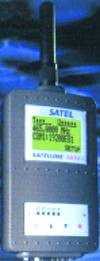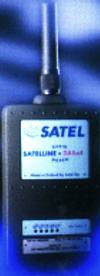

Use of wireless technologies such as DECT and GSM is growing more rapidly than the traditional fixed copper line telecommunication. Not only are base stations and networks easier and less costly to roll out, but they are infinitely more flexible. GSM provides for total mobility in terms of reception while a DECT telephone system can be simply relocated through moving the receiver/transmitter.
This same phenomenon of wireless technology replacing traditional cable is today impacting on the process control and other industries. Instead of costly cable runs, wireless transmitter and receiver systems can be rapidly and cost-effectively installed. Changes to the plant layout do not require new cable installation, the radio modems being moved along with the plant they monitor or control. Apart from in-plant use, the wireless solution is an ideal way in which factory data can be made accessible in realtime to management located in a different building or even a remote site, at distances of up to 40 km.
The wireless solution
At the forefront of this new industrial wireless technology is a Finnish company called Satel Oy (Satel). Satel was founded in 1986 by a group of engineers with a deep knowledge of wireless data communication devices (remember that Finland is also home to Nokia). Its focus was on the development and manufacture of radio modems designed for wireless data communication. These radio modems - of which Satel has released twenty different types since 1987 - can be used in a wide range of applications including industrial automation and process control, monitoring and control of energy/water systems, and traffic control. They can be used in both mobile and fixed applications and even, in the case of the latter, can be redeployed with only new power cabling required.
By 2001 the turnover of Satel had increased to some Ç8 million, more than 80% of its income being from export sales. The company has virtually doubled its turnover since 1998 and has almost trebled the production volume to 20 000 units per year. In excess of Ç2 million has been invested over the last three years in new business premises, improved production facilities and R&D (over ?0,5 million). Satel recently achieved certification to the new ISO 9001:2000 standard, this covering its design, manufacturing and sales activities.
Despite its huge success, Satel employs a modest 45 people in Finland with some half of these being involved in development. Sales are conducted through a worldwide network of distributors located in thirty countries from regions such as North America to the Far East. These distributors are currently active in more than 40 countries. Satel prides itself on the fact that its appointed distributors have a common denominator - 'solid experience and impeccable professional expertise in the field of wireless data communication'.

Products offered
In terms of its product lines, Satel operates in two main business areas, namely wireless data transfer and wireless alarm transfer. In terms of wireless data transfer the SATELLINE range of radio modems currently accounts for about 65% of sales. For industrial applications, the most common and versatile products are the SATELLINE 3AS and 3ASd - the transmitter power here allows communication over distances in excess of 10 km. The 3AS range is compatible with the three most widely used data interfaces, namely RS232, RS422 and RS485 (lower spec products with just an RS232 interface are also available).
Local representation
A new company called Satel SA has been created to represent the Finnish company in South Africa. Satel SA is in turn owned by Cosy Care who also run the Lapp Cable business that supplies specialised cable to industry. Mark Dilchert, currently sales director of Lapp Cable will be at the helm of Satel SA. Dilchert intends to build up the Satel business in South Africa through its large current base of process industry customers and the company's broad knowledge of ProfiBus protocol. The staff at Satel SA intend to live up to the parent company's commitment and will be a distributor with solid experience and impeccable professional expertise. All technical staff will be trained in Finland and will have realtime communications with experienced applications engineers at the factory. After establishing the technology in the process industry, Dilchert believes that new opportunities will open up in areas such as water and wastewater, energy, and the transport industry where applications include ports, airports and public transport systems.
For more information contact: Mark Dilchert, Satel SA, tel: 011 887 2898, e-mail: [email protected]

© Technews Publishing (Pty) Ltd | All Rights Reserved